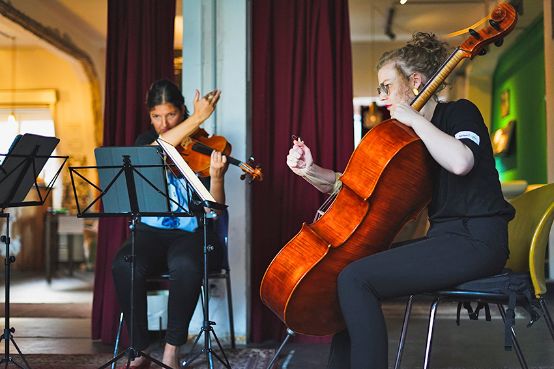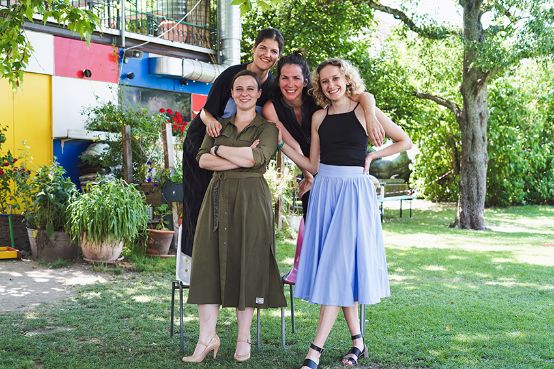Female Classics: The two percent you never hear about
FemaleClassics, a new festival in Zurich, exclusively presents chamber music by female composers, played by female instrumentalists, thus setting an example.

A newly discovered trio by Mendelssohn? Or a quintet by the forgotten Heinrich von Herzogenberg? Anyone who didn't have a program booklet to hand and didn't know the context of the performance might wonder which 19th century composer the two unknown but artistically attractive string pieces could have come from. Composer? No answer. The two works were written by a woman, the Englishwoman Ethel Smyth.
Her String Quintet op. 1 from 1883, like Schubert's famous C major Quintet, uses two cellos instead of the usual two violas. Anna Mikolášek, Nevena Tochev (violins), Meredith Kuliew (viola), Elodie Théry and Lidewij Faber (cellos) used all their interpretative ambition and illuminated the composition from its best side. All five movements of the quintet captivate with a successful combination of comprehensibility and craftsmanship; occasionally a certain redundancy in the melody can be detected.
Ethel Smyth, who studied in Leipzig against her parents' wishes and who became known not only as a composer but also as a women's rights activist, perfectly embodies the message of the newly founded FemaleClassics music festival: In a music genre in which 98 percent of compositions are performed by men, the aim is to draw the public's attention to the neglected music of women. Three chamber concerts in the Kunstraum Walcheturm and the Photobastei in Zurich realized this aim in an inviting way.
Signal to music institutions
Meredith Kuliew is the initiator and artistic director of the festival. After studying viola in Zurich and Lucerne, she now performs in various formations. She is assisted by musicologist Eva Ruckstuhl as co-director. She works in the areas of concert organization and communication, until recently at the Tonhalle Society Zurich. In their professional lives to date, both directors have found that female composers play a negligible role in the programs of most event organizers.
-

The board includes Viviane Nora Brodmann, Brigitta Grimm, Meredith Kuliew and Eva Ruckstuhl. Photo: FemaleClassics
"I had no desire to spend my life playing Brahms' two viola sonatas. With just a few clicks on the internet, I was astonished to find many exciting works by female composers in one go," explains Kuliew, and Ruckstuhl adds: "People always talk about dusting off the classical music scene, but the repertoire always remains the same. Nowadays, feminist programming could also be used as a sales argument." In addition to making female composers visible, the two are also concerned with raising public awareness and, beyond the festival, sending a signal to music institutions.
In addition to the Smyth evening, there was a concert with the juxtaposition of a piano trio by Fanny Hensel and a piano quintet by the African-American composer Florence Beatrice Price. And a contemporary program also combined a well-known composer with an unknown one. In 1988, the now 91-year-old Sofia Gubaidulina wrote a string trio that makes some demands on the audience with its tonal variability and intricate formal progressions. The violinist Nevena Tochev, the violist Meredith Kuliew and the cellist Elodie Théry, who together form the TriOlogie String Trio, were not afraid to show the disturbing sides of the work.
The bow: my forearm
This contemporary program was given a special touch by the world premiere of the string trio Closer to the body by the 30-year-old composer Asia Ahmetjanova. The Latvian lives in Lucerne and studied composition with Dieter Ammann, among others. The "joke" of the piece is that the performers play without bows. The bow hairs are attached to the players' elbows and wrists, turning their arms into bows, so to speak. This results in sounds of a very ethereal, ungrounded character that are not always exactly predictable. The inability to achieve a "perfect" interpretation is precisely the basic idea of the piece, explained the composer in conversation with musicologist Viviane Nora Brodmann, who had previously given an introduction to the evening.
The FemaleClassics festival is to take place again in the future, but the date is still open. For the second edition, it is hoped that it will be less string-heavy, that the concert introductions will be a little more rhetorically refined and that more publicity will attract a larger audience. The interpretative quality of the players and the expressiveness of the programs definitely deserve it. And making female composers visible and audible has only just begun.








